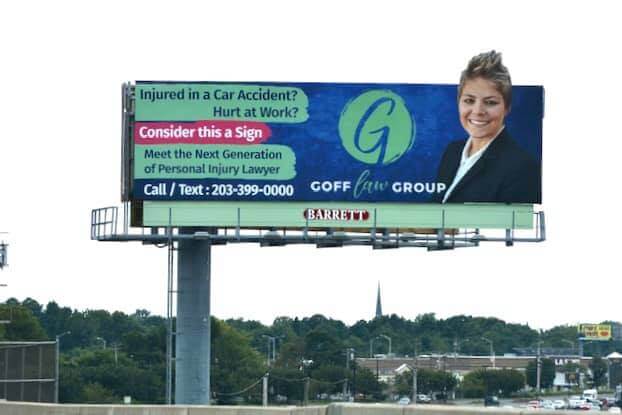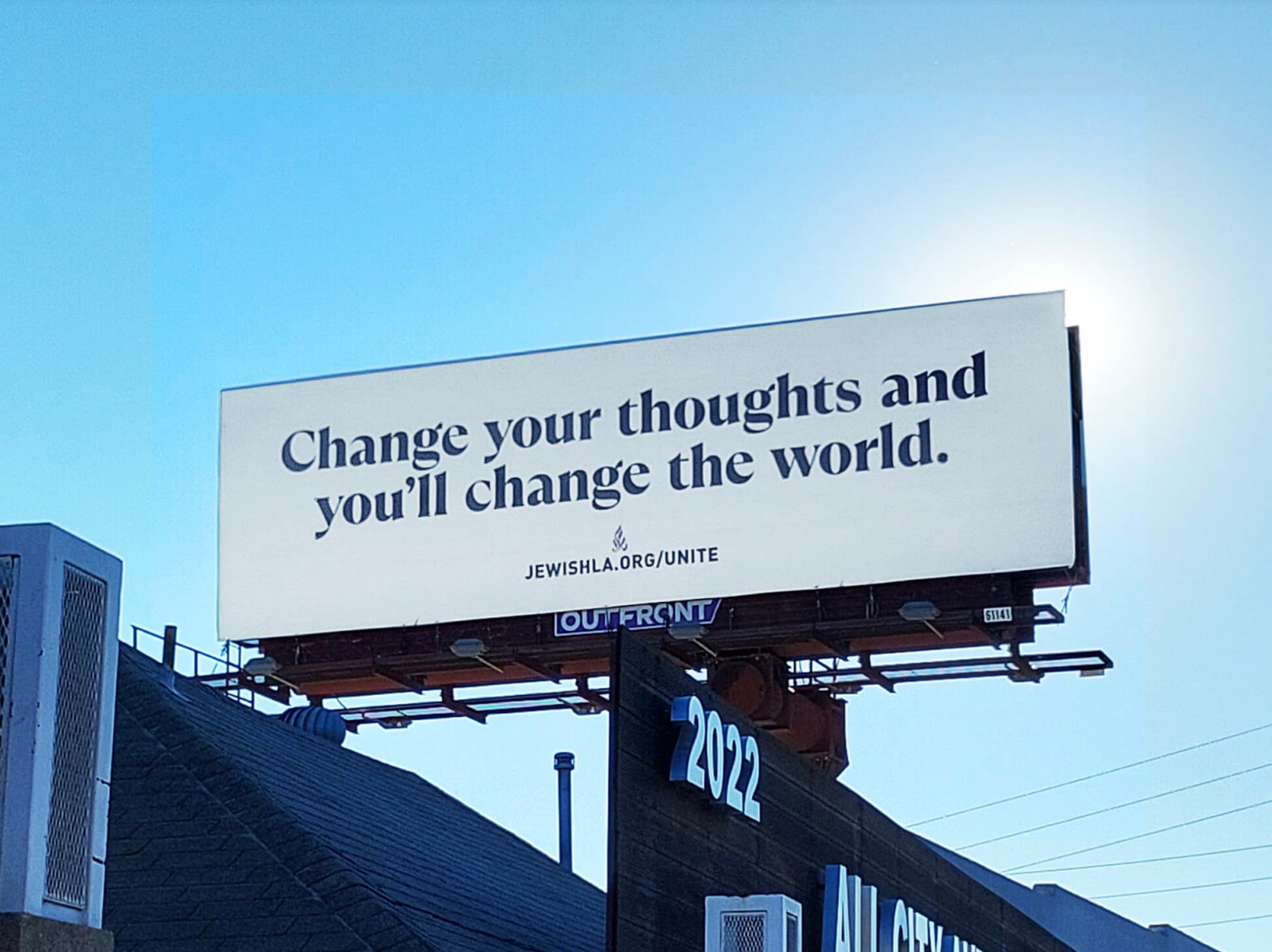Billboards urge people to convert to Christianity — but can they make antisemites see the light?
An old-fashioned form of advertising has become the go-to for religious causes. Why?

Christian billboards pop up next to highways across the country. Illustration by Mira Fox/GospelBillboards.org
Every two weeks or so, I make the drive up or down I-95 between Brooklyn and Providence, Rhode Island, where my boyfriend lives. He usually drives, and I usually look at the billboards.

There are ads for restaurants off highway exits, surgery centers offering gastric bypass surgery, and the ubiquitous billboards for personal injury law firms. In Connecticut, there’s a sign for a company called “Conservative Move,” offering to relocate families from blue states to red ones.
And then there are the Christian billboards.
“Genuine Christians FORGIVE like Jesus. Call (83) FOR-TRUTH” trumpets a billboard outside Stratford, Connecticut. On the other side of the highway, a towheaded boy gazes beatifically upward at an unseen adult’s hand. “Love Jesus? Joyfully obey Him!” the billboard says.
As we drive through the Bronx, a massive sign reminds me to “Value all children like Jesus does” with an image of a chubby baby. It feels like a not-so-subtle exhortation against abortion.
Across the United States, there are more than a thousand of these billboards, all advertising the same hotline. (They’re not the only brand of Christian billboard, but they are perhaps the most widespread.)
But would anyone driving by really be converted? Pulling off the highway to grab a mid-roadtrip lunch at the advertised Cracker Barrel is one thing, but changing your religion is a big decision to make off of a roadside sign.
In an era when we can beam ads directly into people’s brains via their phones, where algorithms allow marketers to target the exact audience they want, where it’s easy to engage people who can immediately swipe up on an Instagram post to purchase something right there in the app, why bother putting up billboards at all?
Jews on board for billboards

Christians are not the only ones putting up billboards; Jews have also recently gotten into the out of home (OOH) advertising game, as the category containing billboards, mobile bus ads and subway signs is known.
First, there was JewBelong, which placed instantly-recognizable magenta signs around New York with strident messages that often target progressives like, “Being woke and antisemitic is like being a vegan who eats veal.” After a much-publicized anti-Zionist controversy about so-called “Jew-free zones” at the University of California at Berkeley, the organization posted signs in the area reading, “You don’t need to go to law school to know that anti-Zionism is antisemitism.”
The Jewish Federation of Greater Los Angeles also jumped on the trend, placing vague sayings about tolerance around the city; one billboard reads “Change your thoughts and you’ll change the world.” The slogans aren’t really Jewish and don’t mention antisemitism. Shine A Light, a new campaign funded by Jewish billionaire Natie Kirsch, has been running billboards with messages encouraging viewers to, “Shine a light on antisemitism.” (In the more expensive world of TV ads, Patriots owner Robert Kraft is spending $25 million on ads against antisemitism.)
Jewish ads have been fighting antisemitism since at least 1938, when the American Jewish Committee began a multimedia campaign led by advertising executive Richard Rothschild. Through comic books about patriotic Jewish soldiers in the war effort, radio shows extolling America’s diversity and political comics spoofing bigots as old-fashioned, they portrayed Jews — as well as African Americans, Irish and Italians — as part of the fabric of the country. Yet almost none of it mentioned antisemitism by name.
“People are not necessarily going to be interested in the problem or interests of the Jews, so he presents this as a danger to the country as a whole,” said Charlotte Bonelli, the AJC’s archivist.
This could not be farther from today’s ads, which generally meet antisemitism head-on, with a splash, and a heavy dose of guilt and fear. But it’s hard to say which is the better strategy because the impact of public interest ads is hard to measure. Even tracking how many people have seen or noticed a billboard is tricky, much less attempting to assess whether it changed public opinion.
And yet, funders seem eager to back splashy Jewish billboard advertising campaigns, and the signs get frequent news coverage. So I set out to try to better understand the phenomenon.
Do billboards, you know, work?

If you see an ad for an outlet mall, you can immediately pull off at the advertised exit to go shopping. The personal injury law firms have catchy phone numbers you might remember if you get into a fender-bender. PSAs about texting and driving can hopefully impact your highway behavior.
But no one is making the spontaneous decision to pull off the highway to get a hip replacement, as several Connecticut billboards advertise with photos of middle-aged men, mid-golf swing. And picking a Wi-Fi provider is not a decision one makes on the road any more than picking a spiritual provider is.
Rick Wilson, a professor of advertising at Texas State University, studies Out-of-Home advertising. He told me that OOH is the second-fastest growing form of marketing (after digital, online ads). That’s because they do work — but only if they’re done well.
Placement is key, even down to the sign’s angle. And, of course, the billboards need to be eye-catching and simple enough to grasp quickly.
How much impact do they have? It’s hard to say. Wilson explained that some studies have tracked participants via their phones, showing a correlation between passing a billboard and showing up to the advertised business. But the result is often not so obvious.
“The end goal is not always sales. Sometimes it’s just like, ‘I want to get people to remember my brand name.’” Wilson said. “We’re more apt as humans to pick a product that we’re familiar with, even if we might not know anything about it.”
But what American hasn’t already heard of Jesus?
The mission of a missionary billboard

Christian Aid Ministries, which is responsible for most of the religious billboards I see on my drive, describes itself as a “conservative Anabaptist organization,” a branch of Christianity demarcated by a belief in adult baptism; the group includes Mennonites and the Amish. On the website, the organization says that the billboard campaign’s “goal is to lift up Jesus Christ, not a particular denomination.”
They’re not alone in that goal; HeGetsUs, an ad campaign that shot to fame this year thanks to its multi-million dollar Super Bowl spots, describes its mission as an effort “to move beyond the mess of our current cultural moment to a place where all of us are invited to rediscover the love story of Jesus.” It, too, runs billboards, with slogans like “Jesus let His hair down too. He Gets Us — All of Us.”
Despite their similar goals, the two campaigns take very different tactics.
HeGetsUs seeks to paint Jesus as relatable and human, leaving any explicit mention of Christianity and God out of nearly all of its materials. The site even says that they are not trying to convince their audience to go to church or even believe in the religious aspects of Jesus, just to “strive to love others better.” (They do, however, go on to say that “many churches and Christian groups” offer great opportunities to get to know Jesus.)
The Christian Aid Ministries billboards, on the other hand, cite New Testament verses and nearly all mention God, the bible or capital-T Truth. They also often use a far more fire-and-brimstone tone. One billboard reads: “Where are you going: HEAVEN or HELL?” This one, according to their newsletter, brings in the most calls.
The billboards’ ultimate goals are always to bring viewers to some next step to engage them further, and while the billboards may not be attempting to convert anyone, the person you get on the phone or website might be.
83-FOR-TRUTH

Yes, of course I called the billboard hotline. I was greeted by a menu offering pre-recorded sermons, each tied to a specific billboard. I listened through several, all featuring the same broad-voweled Midwestern accent.
For a billboard with the slogan, “JESUS: Your only way to God,” the narration explained that the Gospel of John provides undeniable evidence that Jesus truly rose from the dead, which seemed like it would only make sense if you already believed that the Book of John was, well, gospel. In which case, you’re probably already at least kind of Christian.
Next, I tried the option advertised for those who are “feeling lonely or discouraged,” which seemed to quote Shrek’s “ogres are like onions” speech. “People have been compared to onions,” the drawling voice said. “Like an onion, we have layers — layers of relationships.” God, it concluded, was the only one who could see all your layers.
Eventually, I found a live volunteer who spoke to me in a slow, calming drawl and asked me if my Judaism was merely cultural. I described my love of Jewish rituals and shul, and he opined that my spiritual needs weren’t being met.
Admittedly, he was right that I don’t have a personal relationship with God. But he couldn’t seem to grasp that it doesn’t bother me.
He told me about his small Kansas town, where the only restaurant is a Dairy Queen and, eventually, he recommended a TED talk about happiness and the importance of relationships, which he promised was totally secular but would nevertheless connect me to God’s plan.
I got the sense that he thought our whole conversation was very secular and indirect. My impression was a little different. It often felt as though we were speaking different languages. He referenced the New Testament repeatedly and explained that morality was self-evident proof of God. And he affirmed — as gently as possible — that I would, yes, go to hell if I did not believe in Jesus.
Converting antisemites — or Jews?
Jewish billboards aren’t marketing Judaism; we don’t evangelize. Instead, they’re usually trying to fight antisemitism. But their tone and intended audience are unclear, and there’s rarely a next step beyond a website — there’s no hotline to call, no online chat and sparse resources with which to engage further.
Perhaps this is because they often lack the resources and expertise. While Shine A Light worked with four different ad agencies, JewBelong is the personal project of its founder Archie Gottesman, who worked in advertising for her family’s storage business previously. (Also, JewBelong consulted on Shine A Light’s billboards, so things are a little circular.) The Jewish Federation of Greater Los Angeles’s billboards were designed by a Federation executive, Rob Goldberg. They’re not drawing on a deep pool of advertising know-how.

Johnnie Moore, an evangelical leader and founder of the Kairos communications firm, said the key for issues-based marketing is to connect emotionally. “People have to feel it,” Moore explained. “They have to see and understand a message that feels like it sees and understands them. They have to connect it to their everyday life.”
But that’s easier said than done. Plenty of people in the U.S. have never met a Jew — including Moore, who grew up in the Deep South and didn’t know anyone Jewish until he was an adult — which makes it easier to believe antisemitic libel. And these people are too far from the Jewish world to even understand some of these billboards.
“More than just the passing billboard, it has to be part of a larger plan in order to provide the educational capacity necessary,” Moore said.
“In the case of antisemitism, we certainly can know which communities are most vulnerable, the types of individuals who are most vulnerable,” he explained. “You can identify particular messages for those particular audiences and you can deliver them in a really targeted way.”
But this, he said, requires serious data and analytics; his staff usually spends months pulling together reams of research for a campaign and he hadn’t heard of any Jewish organization working with the major agencies that have access to this kind of information.
The thing is — few of the Jewish billboards seem to be even trying to reach the kinds of isolated Christian communities Moore talked about. Instead, they seem to be talking to other Jews.
Most of the anti-antisemitism signs are posted in urban areas such as Los Angeles, San Francisco and New York and rely on cultural context and knowledge that don’t always translate.
Some of the JewBelong ads, in particular, may check off Moore’s emotional response quotient — they reference comments and criticisms some Jews have likely heard, often about Israel, which is the kind of thing that elicits strong feelings. (Some even seem be trying to shame Jewish progressives in particular — as CEO Gottesman told me last year, “when people are anti-Israel, I don’t think JewBelong is for them.”)
But these messages might not have the same impact on non-Jews; the messages can be hard to understand if you’re not already inside the world of antisemitism education. Without explanation, the implicit antisemitism of saying “You’re not like other Jews,” as one Shine A Light sign reads, might not be obvious.

Shine A Light has a handful of short explanatory videos on their site; JewBelong glosses over every antisemitic stereotype in one paragraph; the Jewish Federation of Greater Los Angeles simply has a few quotes about coexistence. It’s unclear whether the signs are aimed at antisemites, or at fellow Jews, who are most likely to understand their references.
This, according to Gary Wexler, is part of a long-standing issue within the Jewish community when it comes to advertising: The campaigns often go more on vibes than on hard data.
Wexler left corporate advertising and then spent decades working for the Jewish world, making advertisements for Jewish organizations, and said they paid little attention to concerns like measuring impact or studying audiences.
“I’d say to them ‘What’s your bottom line?’ And they’d say to me, ‘We want to create awareness.’ And it’s like, no, you’re not in the business of awareness — you’re in the business of bottom lines and being able to achieve them,” Wexler said. “But they don’t want to do that because it’s not as much fun.”
“Each thing is like a shot in the dark that they put out there for a while,” he added.
This doesn’t feel far off from the Christian Aid Ministries billboards, which seemed unlikely to speak to anyone who wasn’t already Christian. Sure, the hotline offered more opportunity for engagement and learning than the Jewish sites. But, as a Jew, a conversation about Jesus and the New Testament gave me little to connect to, just as the Jewish billboards often give non-Jews little to grasp onto. Both billboard campaigns seem fundamentally unable to put themselves in someone else’s shoes, instead putting up signage that would only speak to an in-group audience.
Moore said this isn’t uncommon in billboards — as the most affordable form of advertising, they’re the easiest to access and individuals or smaller organizations are able to buy space and post a message without having to think it through too much.
Still, he didn’t think the billboard campaigns were a bad place to start — as long as there was more later.
“We’re not in a situation where it comes to antisemitism where we should be picking and choosing,” Moore said. “People should do whatever they can do to combat this horrific increase.”






















